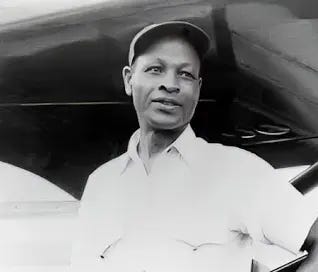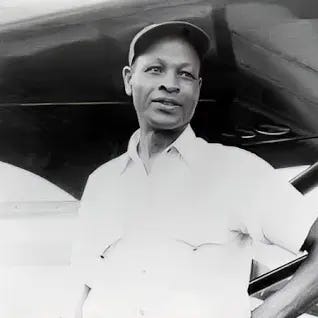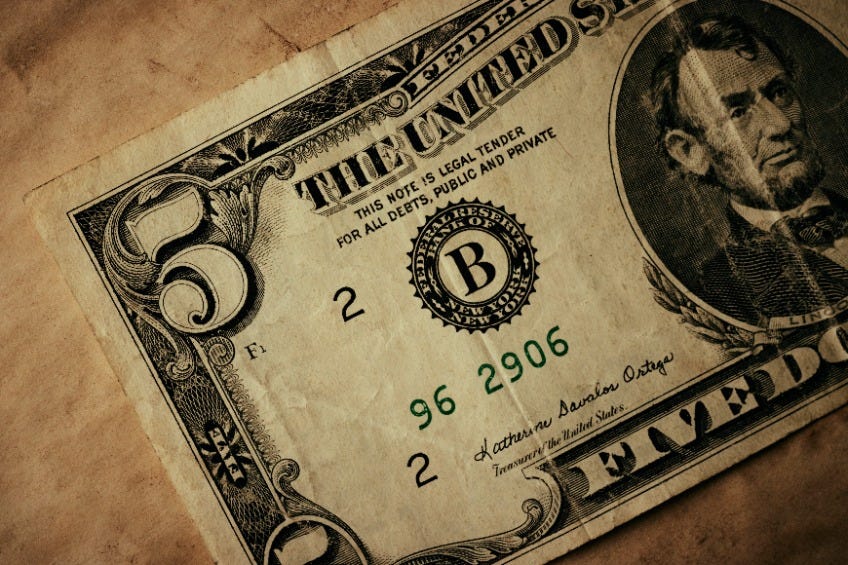Today In Black History
Cornelius Coffey, Educator and Aviator, opened the first African American pilot training school in the U.S.
Issue #561 Today In Black History, Tuesday, April 9, 2024
Today’s Black History WOW!
Cornelius Coffey was the first African American to create a non-university-affiliated aeronautical school in the United States. He was born on September 6, 1903, in Newport, Arkansas, and his love for aviation was sparked by a fascination with machines.
When Coffey was a teenager, a World War I veteran and barnstormer offered rides in his airplane when he arrived in Coffey’s hometown of Newport, Arkansas. When Coffey got his turn in the passenger seat, the pilot remarked on his fearlessness and told him to consider taking up flying.
A top graduate from the Chicago School of Automotive Engineering in the late 1920s, Coffey initially found employment at a Chevrolet dealership. Coffey wanted to fly, but no one would teach him. As a result, Coffey built a one-seat airplane with fellow Black mechanic John Robinson, powered by a motorcycle engine, and the two taught themselves to fly.
In 1929, Robinson and Coffey were accepted into an aviation mechanics program at the Curtiss-Wright School of Aviation in Chicago, but the school tried to revoke their admittance once they learned the men were Black. Emil Mack, the white owner of the dealership Coffey and Robinson worked for, threatened to sue the Curtiss-Wright School of Aviation. The school reluctantly let the pair attend the program. In 1931, Coffey graduated first in his class as an Aircraft Master Mechanic, with Robinson second.
Coffey went on to earn his mechanic’s license from the U.S. government and eventually, the Curtiss-Wright School of Aviation invited both men back to teach all-Black classes. Continuing his education, Coffey graduated from Aeronautical University in 1939 as an Aircraft Engine Mechanic, where he was one of the first two Black Americans at the school, and the first Black American to hold an Aircraft Engine Mechanic’s certificate. Coffey also became the first Black American to hold both a pilot’s and mechanic’s license.
Coffey, along with Robinson formed the Challenger Air Pilots Association. The group and a couple of other white pilots from Akers Airport bought a tract of land in an all-Black town southwest of Chicago named Robbins.
Cornelius Coffey was the first Black American to establish an aeronautical school. From 1938 to 1945, more than 1000 students went through the Coffey School of Aeronautics, many of whom would go on to become members of the Tuskegee Airmen during World War II.
Coffey taught both Black and white students, regardless of gender. One such student was Willa Brown—the first Black woman to earn both a pilot’s license in the United States (1938) and a commercial license (1939).
President Franklin D. Roosevelt allotted $10 million to train civilian pilots to join the Army Air Corps. Coffey and the rest of the NAA feared that Black aviators would be left out. The two met with then-Senator Harry Truman, who reportedly commented, “If you guys had the guts to fly this thing to Washington, I've got guts enough to see you get what you are asking.”
Legislation was eventually passed allowing Black Americans to participate in the Civilian Pilot Training Program. Truman would later go on to integrate the armed services by executive order when he was the President in 1948.
During World War II, the Coffey School offered elementary (primary) and advanced military flying instruction. The Coffey School of Aeronautics also taught cross-country flight instruction. In 1942, Coffey himself became a commissioned Captain in the Civil Air Patrol, a civilian auxiliary of the United States Air Force.
After the war, Coffey left Harlem Airport and served as an instructor at the Lewis School of Aeronautics in Lockport, Illinois, and later at Chicago's Dunbar Vocational High School where he trained some of the first Black Americans to be hired as mechanics by commercial airlines.
In 1980, the FAA established the COFEY intersection (the missing “F” is because radio checkpoints are limited to 5 letters) at Chicago Midway Airport for airplanes making final course corrections. There is a waypoint located on the VICTOR 7 airway over Lake Calumet that continues to provide electronic course guidance to planes landing at Chicago’s Midway Airport.
In 1991, the National Aeronautic Association named Coffey an Elder Statesman of Aviation.
In 1993, the Cornelius R. Coffey Aviation Education Foundation was founded to aid women and minorities who aspire to work in aircraft maintenance.
Cornelius Coffey became the first president of the National Airman’s Association and continued flying until he was 89 years old.
Cornelius Coffey passed away on March 2, 1994, at age 91.
Today In Black History
- In 1816, Richard Allen was elected as the first Black bishop of the African Methodist Episcopal (AME) Church in Philadelphia, Pennsylvania.
- In 1865, Confederate General Robert E. Lee and 26,765 troops surrendered at Appomattox Court House to Union Lt. General Ulysses S. Grant, ending the Civil War in Northern Virginia.
- In 1866, the Civil Rights Bill was passed over the veto of President Andrew Johnson, conferring citizenship on Blacks and giving them “the same rights in every State and Territory…as is enjoyed by white citizens (men).”
- In 1919, the African Orthodox Church was organized by George Alexander McGuire.
- In 1939, Marian Anderson performed an outdoor concert for 75,000 in front of the Lincoln Memorial after the Daughters of the American Revolution refused to allow her to perform in Constitution Hall to an integrated audience because she was Black.
- In 1950, Juanita Hall became the first African American to win a Tony Award for Best Supporting Actress for her role as Bloody Mary in the play “South Pacific.”
- In 1990, acclaimed scientists Percy Lavon Julian and George Washington Carver became the first Blacks elected to the National Inventors Hall of Fame.
- The “Comments” feature has been disabled. Instead, let’s discuss these facts in our community on Substack Notes. You can also read other Substack publications without subscribing to them when you join Notes.
This post is free to read/listen to for three days after publication. To have 365 24/7 access to all our posts and podcast episodes and financially support “We Are Speaking” for no more than $5 per month, please subscribe at the paid level. You will receive a 7-day FREE trial!






